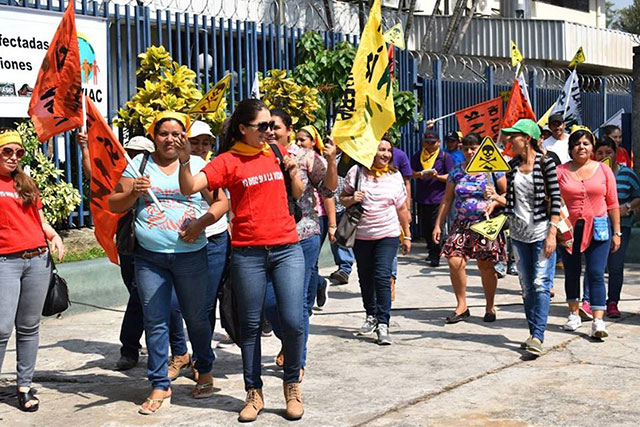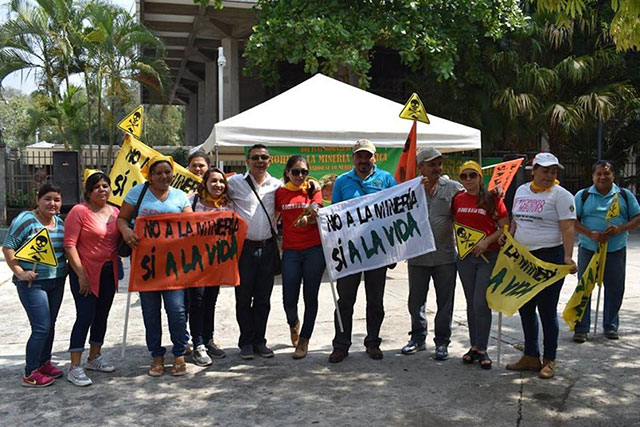
Legislators in El Salvador made history Wednesday, passing a bill to ban all metallic mining activities in the country.
The results of the much-anticipated vote were unanimous: 69 in favor, none against, and no abstentions. Fifteen of the country’s 84 lawmakers did not show up for the vote.
The result “makes tiny El Salvador the unlikely hero in a global movement to put the brakes on a modern day ‘gold rush’,” MiningWatch Canada wrote in a statement Thursday. The Central American nation is the first country in the world to ban mining for gold and other metals, according to the industry watchdog group.
With the exception of a transition period for small-scale artisanal gold miners, the law provides for an immediate, definitive, and permanent ban on all metals mining, including exploration activities. No old permits or license applications will be grandfathered in, according to the succinct 11-article bill. It will take effect one week after its publication in the official government gazette.
“Today’s a historic day, thanks to all the struggle over the years for a ban on metallic mining,” FMLN legislator Guillermo Mata said during the discussion in the legislative assembly Wednesday, shortly before the bill was put to a vote.
Francis Zablah, a legislator from GANA, one of the three main political parties in the country together with the FMLN and ARENA, lauded the multi-partisan commission on the environment and climate change for rising above inter-party political divisions to advance the bill.
“The interests of the country prevailed above all. That should prevail in every commission,” Zablah told his colleagues on the floor before the vote.
On the floor of the legislative assembly, yellow cloth signs reading ‘No To Mining, Yes To Life’ were draped over the front of many lawmakers’ desks. Banners and signs with similar messages were carried by activists gathered inside and outside the legislative assembly in anticipation of the legislated ban.
Communities and NGOs in El Salvador have campaigned for years for an all-out ban on metallic mining in the country, organizing marches, bill proposals, and local actions. Residents of five municipalities in the northern departments of Chalatenango and Cabañas have voted overwhelmingly against mining in municipal referendums, the latest of which was just last month.
After a decade of calls for a legislated mining ban to no real avail, the issue suddenly gained traction earlier this month. Legislators from the country’s three main political parties received representatives from a church-led march and promised to pass the ban before Easter Week. The legislative assembly’s multi-partisan commission on the environment and climate change quickly got to work on the proposed text.
Before their final vote on the bill proposal, members of the commission heard from a delegation from the Philippines, home to OceanaGold’s gold and copper Dipidio mine, located some 167 miles north of Manila in the provinces of Nueva Vizcaya and Quirino. For years, the same Australian-Canadian mining company has been attempting to get its controversial El Dorado gold mining project off the ground in El Salvador.
Carlos Padilla, governor of the Philippines province of Nueva Vizcaya, and others travelled to El Salvador to support the mining ban and to draw attention to the negative social and environmental impacts they attribute to OceanaGold’s operations. In fact, the government of the Philippines ordered the Dipidio mine be suspended last month, but it continues to operate while legal action takes place.
“The Dipidio operation has not violated or breached any Philippines laws, rules or regulations. In fact, OceanaGold has a successful track record of operating for 27 years in accordance with Australian and Canadian standards on health, safety, environment, community and sustainability across all our operations,” OceanaGold stated in a media release February 14, 2017, the day it received the suspension order.
Padilla begs to differ. “The reality of OceanaGold’s so-called ‘responsible mining’ in the Philippines has been an environmental disaster. Judge it by the reality of its mining operations in my country not by its words or promises,” he said in a statement Wednesday.
 After a decade of working for a national ban on mining, Salvadoran social movement activists gathered in the capital to celebrate its imminent passage into law. (Photo: courtesy of CRIPDES)
After a decade of working for a national ban on mining, Salvadoran social movement activists gathered in the capital to celebrate its imminent passage into law. (Photo: courtesy of CRIPDES)
A moratorium on mining has been in place in El Salvador since 2008, the same year the government denied key permits related to El Dorado, then owned by Pacific Rim, a Canadian company since acquired by OceanaGold. The following year, the company filed a claim against El Salvador with the International Centre for the Settlement of Investment Disputes (ICSID), a supranational arbitration tribunal housed at the World Bank Group.
Last October, ICSID found in favor of El Salvador and ordered OceanaGold to pay the country $8 million in legal costs. Earlier this month, an OceanaGold spokesperson told Mongabay that the company is committed to due process but was waiting on the outcome of supplementary proceedings filed by El Salvador in December, following the ruling.
That’s not how ICSID sees it. On Tuesday, El Salvador’s legal team received notification that the tribunal has ordered OceanaGold to pay the $8 million immediately or it will be subject to between two and five percent in monthly interest, depending on the outstanding amount.
OceanaGold did not provide comment on the latest news from ICSID nor on Padilla’s statement, but later sent Mongabay a statement from one of its subsidiaries in El Salvador, Minerales Torogoz.
“Minerales Torogoz acknowledges the outcome of the recent vote by El Salvador’s Congress to approve a law prohibiting metallic mining in the country,” the company wrote in its statement Thursday.
“The Company is now evaluating its next steps but confirms that the El Dorado project and any opportunity in El Salvador are not part of the business strategy at this time,” according to the Minerales Torogoz statement.
Now that the law banning mining has been passed, the campaign to pressure OceanaGold to pay and leave El Salvador is likely to heat up.
Aside from OceanaGold, the one remaining issue with regard to metallic mining in El Salvador is the fate of small-scale artisanal gold miners, many of whom are operating in unsafe, toxic conditions. The new law grants them a two-year grace period to transition out of mining and establishes that the state will provide them support and technical assistance for that purpose.
Help us Prepare for Trump’s Day One
Trump is busy getting ready for Day One of his presidency – but so is Truthout.
Trump has made it no secret that he is planning a demolition-style attack on both specific communities and democracy as a whole, beginning on his first day in office. With over 25 executive orders and directives queued up for January 20, he’s promised to “launch the largest deportation program in American history,” roll back anti-discrimination protections for transgender students, and implement a “drill, drill, drill” approach to ramp up oil and gas extraction.
Organizations like Truthout are also being threatened by legislation like HR 9495, the “nonprofit killer bill” that would allow the Treasury Secretary to declare any nonprofit a “terrorist-supporting organization” and strip its tax-exempt status without due process. Progressive media like Truthout that has courageously focused on reporting on Israel’s genocide in Gaza are in the bill’s crosshairs.
As journalists, we have a responsibility to look at hard realities and communicate them to you. We hope that you, like us, can use this information to prepare for what’s to come.
And if you feel uncertain about what to do in the face of a second Trump administration, we invite you to be an indispensable part of Truthout’s preparations.
In addition to covering the widespread onslaught of draconian policy, we’re shoring up our resources for what might come next for progressive media: bad-faith lawsuits from far-right ghouls, legislation that seeks to strip us of our ability to receive tax-deductible donations, and further throttling of our reach on social media platforms owned by Trump’s sycophants.
We’re preparing right now for Trump’s Day One: building a brave coalition of movement media; reaching out to the activists, academics, and thinkers we trust to shine a light on the inner workings of authoritarianism; and planning to use journalism as a tool to equip movements to protect the people, lands, and principles most vulnerable to Trump’s destruction.
We urgently need your help to prepare. As you know, our December fundraiser is our most important of the year and will determine the scale of work we’ll be able to do in 2025. We’ve set two goals: to raise $150,000 in one-time donations and to add 1,500 new monthly donors by midnight on December 31.
Today, we’re asking all of our readers to start a monthly donation or make a one-time donation – as a commitment to stand with us on day one of Trump’s presidency, and every day after that, as we produce journalism that combats authoritarianism, censorship, injustice, and misinformation. You’re an essential part of our future – please join the movement by making a tax-deductible donation today.
If you have the means to make a substantial gift, please dig deep during this critical time!
With gratitude and resolve,
Maya, Negin, Saima, and Ziggy